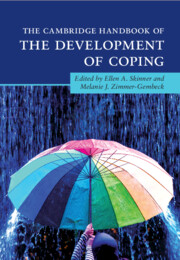Book contents
- The Cambridge Handbook of the Development of Coping
- Cambridge Handbooks in Psychology
- The Cambridge Handbook of the Development of Coping
- Copyright page
- Contents
- Contributors
- Preface
- 1 A Systems Perspective on the Development of Coping
- Part I Theoretical Perspectives on the Development of Coping
- Part II Methods for Studying the Development of Coping
- Part III Neurophysiological and Experiential Bases of the Development of Coping
- Part IV Psychological Foundations of the Development of Coping
- Part V Social Contexts and the Development of Coping
- 17 Coping Development as an Everyday Interpersonal Process
- 18 Parenting, Socialization of Emotion, and the Development of Coping
- 19 Temperament, Family Context, and the Development of Coping
- 20 Interparental Conflict, Parental Relationship Dissolution, and the Development of Children’s Coping
- 21 Autonomy, Self-Determination, and the Development of Coping in Adolescence
- 22 Peer Stressors and Peer Relationship Dynamics in the Development of Coping
- 23 Income, Income Inequality, Community, and the Development of Coping
- 24 Culture, Diversity, Context, and the Development of Coping
- Part VI Application and the Development of Coping
- Index
- References
23 - Income, Income Inequality, Community, and the Development of Coping
The Reformulated Adaptation to Poverty-Related Stress Model
from Part V - Social Contexts and the Development of Coping
Published online by Cambridge University Press: 22 June 2023
- The Cambridge Handbook of the Development of Coping
- Cambridge Handbooks in Psychology
- The Cambridge Handbook of the Development of Coping
- Copyright page
- Contents
- Contributors
- Preface
- 1 A Systems Perspective on the Development of Coping
- Part I Theoretical Perspectives on the Development of Coping
- Part II Methods for Studying the Development of Coping
- Part III Neurophysiological and Experiential Bases of the Development of Coping
- Part IV Psychological Foundations of the Development of Coping
- Part V Social Contexts and the Development of Coping
- 17 Coping Development as an Everyday Interpersonal Process
- 18 Parenting, Socialization of Emotion, and the Development of Coping
- 19 Temperament, Family Context, and the Development of Coping
- 20 Interparental Conflict, Parental Relationship Dissolution, and the Development of Children’s Coping
- 21 Autonomy, Self-Determination, and the Development of Coping in Adolescence
- 22 Peer Stressors and Peer Relationship Dynamics in the Development of Coping
- 23 Income, Income Inequality, Community, and the Development of Coping
- 24 Culture, Diversity, Context, and the Development of Coping
- Part VI Application and the Development of Coping
- Index
- References
Summary
This chapter describes the development, refinement, and key guiding insights of the Reformulated Adaptation to Poverty-Related Stress (APRS) model. The APRS model elucidates how children (and adults) cope with and adapt to the plethora of stressful exposures and conditions that comprise poverty’s developmental context, and why coping in this stressful context often differs from coping found in less stressful developmental contexts. The chapter articulates implications of the APRS for research that takes context seriously and for interventions that meet children where they are; help them grow broad, flexible coping repertoires; develop the ability to differentiate among domains of stress that require different coping approaches; and learn to tailor one’s coping responses to the type of stressor being encountered. In this way, the APRS can guide researchers and interventionists to dump the deficit model of poor people and embrace the possibilities opened by an appreciation for the remarkable adaptiveness of humans.
- Type
- Chapter
- Information
- The Cambridge Handbook of the Development of Coping , pp. 560 - 580Publisher: Cambridge University PressPrint publication year: 2023

